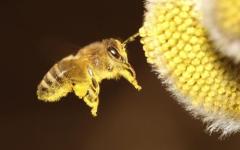Celulares Podem ser Responsaveis por Desaparecimento das Abelhas
June 4, 2010
London Telegraph
Seu desaparecimento causou alarme em toda a Europa e América do Norte, onde os ativistas acusaram o uso de agrotóxicos, as  alterações climáticas artificiais e o advento dos produtos geneticamente modificados pelo que agora é conhecido como a “desordem do colapso da colônia.” Grã-Bretanha tem visto um declínio de 15 por cento da sua população de abelhas nos últimos dois anos, o que levou a um aumento de furtos de colméias.
alterações climáticas artificiais e o advento dos produtos geneticamente modificados pelo que agora é conhecido como a “desordem do colapso da colônia.” Grã-Bretanha tem visto um declínio de 15 por cento da sua população de abelhas nos últimos dois anos, o que levou a um aumento de furtos de colméias.
Agora, pesquisadores do Punjab Chandigarh’s University afirmam ter encontrado a causa que poderia ser o primeiro passo para reverter o declínio: Eles estabeleceram que a radiação dos telefones móveis é um fator chave para o fenômeno e dizem que os telefones estão interferindo com os sentidos de navegação das abelhas.
Eles montaram um experimento controlado em Punjab no início deste ano comparando o comportamento e produtividade das abelhas em duas seções – uma equipada com dois telefones celulares que eram ligados por duas sessões de quinze minutos por dia durante três meses. O outro tinha colméias sem telefones.
Após três meses, os pesquisadores registraram uma queda drástica no tamanho da colméia equipada com os telefones móveis e uma redução significativa no número de ovos postos pela rainha. As abelhas também pararam de produzir mel.
A abelha-rainha na colméia com celulares produziu menos da metade de ovos comparado com as quantidades produzidas pelas suas colegas nas colméias sem telefones celulares.
Eles também encontraram um declínio dramático no número de abelhas operárias que retornaram para a colméia após a coleta de pólen. Por isso, a quantidade de néctar produzido na colméia também diminuiu.
Ved Prakash Sharma e Neelima Kumar, os autores do relatório publicado na revista Current Science, escreveram: “O aumento do uso de aparelhos eletrônicos levou a electropoluição do meio ambiente. O comportamento e a biologia das abelhas tem sido afetados por electrosmog porque estes insetos têm magnetita em seus corpos, o que as ajuda na navegação.
“Há relatos de desaparecimento repentino das populações de abelhas em colônias. A razão ainda não está clara. Nós comparamos o desempenho de abelhas em colônias contendo radiação de celulares com outras colônias onde não houve a presença de telefones.
“A diminuição significativa da colônia e a taxa de colocação de ovos da rainha foi observada. O comportamento das forrageiras expostas a radiação foi negativamente influenciado pela exposição; não havia mel nem pólen na colônia no final do experimento. “
Tim Lovett, da Associação Britânica de Apicultores, disse que as colônias foram bem sucedidas em Londres, onde existe uma utilização alta de telefones móveis. “Os trabalhos anteriores nesta área tem indicado que o uso de telefones móveis não é um fator real”, disse ele. “Assim que os novos dados chegarem, vamos comparar.” Ele disse: “No momento, achamos que é mais provável que seja uma combinação de fatores incluindo doenças, pesticidas e a perda do habitat”.
O Governo do Reino Unido reservou £ 10.000.000 para a investigação do declínio de polinizadores, como abelhas, mas a BBKA alegou que muito mais dinheiro é necessário para a investigação do problema, incluindo estudos sobre pesticidas, doenças e novas tecnologias, como telefones celulares.
De acordo com a Universidade de Durham, as abelhas na Inglaterra estão desaparecendo mais rapidamente do que em qualquer outro lugar na Europa, com mais da metade das colméias morrendo ao longo dos últimos 20 anos. As estatísticas mais recentes mostram que, no último inverno, o declínio das abelhas na Grã-Bretanha diminuiu, com apenas uma em cada seis colméias perdidas. Isto é ainda acima da taxa natural de dez por cento, mas é uma grande melhora em relação aos anos anteriores.
Houve um aumento no número de furtos de colméias em todo o mundo e os apicultores da Alemanha começaram a instalar dispositivos de localização GPS para suas colméias.

